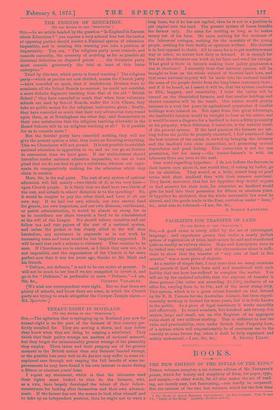THE FRIENDS OF EDUCATION.
(To THE EDITOR OF THE "SPECTATOR.") SIR,—In an article headed by the question "Is England in Earnest about Education ? " you express a very natural fear lest the tactics -of opposing parties should render a National system of education impossible, and in uttering this warning you take a position of impartiality. You say, "The religious party must concede, and concede earnestly, the necessity of avoiding as far as possible all doctrinal definition on disputed points . . . the Secularist party must concede generously the trial at least of this latter enterprise."
Tried by this test, which party is found wanting ? The religious -party—which as parties are now divided, means the Church party —have conceded so much, that if Archdeacon Denison were to nominate all the School Boards to-morrow, he could not establish a more definite dogmatic teaching than that of the old " British School ;" they have conceded so much that when their voluntary schools are used by School Boards, under the 25th Clause, they take no public money for the religious instruction given ; finally, they have conceded so much that their very adversaries turn round upon them, as at Birmingham the other day, and demonstrate to their own satisfaction that the religious teaching allowable in the Board Schools will be no religious teaching at all? Is it possible for us to concede more ?
Bat the Secular party have conceded nothing, they will not give the present system a trial, they insist on dictating everything. This we Churchmen will not permit. It is not possible to establish national education in opposition to us, and we can go no further in concession than we have gone. If our stubbornness should hereafter render national education impossible, we can at least plead that we do our best to give a substitute, whereas our oppo- nents do comparatively nothing for the education which they claim to control.
Here, Sir, is the real point. The cost of any system of national education will fall mainly—two-thirds of it, at the very least— upon Church people. Is it likely that we shall bear two-thirds of the cost, and submit to others' dictation as to the spending? No, it would be simpler to pay the other third, and have it all our own way. If we had our own schools, our own central fund for grants, our own inspectors, and our own diocesan, ruridecanal, -or parish administration, it would be almost as cheap for us as to contribute our share towards a fund to be administered at the will of the League. We should relieve ourselves and our fellow tax and rate payers of the cost of a national system, and unless the pocket is less closely allied to the will than 'heretofore, any movement to supersede us in our work by increasing rates and taxes would be but languidly supported. It will be said that such a scheme i visionary. That remains to be seen. If Churchmen are in earnest, as I think they now are, it is -not impossible, and the organisation of the Church is far more perfect now than it was ten years ago, thanks to Mr. Miall and lie friends.
"Defence, not defiance," is said to be our motto at present. It will not be much to our loss if we are compelled to invert it, and go in for "Defiance," as preferable to mere " Defence."—I am,
[We wish our correspondent were right. But we fear there are plenty of schools, and know there are some, in which the Church party are trying to evade altogether the Cowper-Temple clause.— Ed. Spectator.]


































 Previous page
Previous page